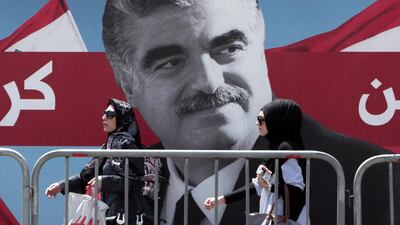Last week, the Special Tribunal for Lebanon, which is trying suspects for the assassination of the former Lebanese prime minister Rafik Hariri, allowed prosecutors to present evidence on the deteriorating relationship between Mr Hariri and the Syrian regime in 2004-2005.
Defence lawyers described the decision as a major expansion in the Hariri trial. That's not surprising. Until now those indicted have been five members of Hizbollah, all accused of participating in the crime at the operational level. The initial indictment prepared by Daniel Bellemare, the Canadian former prosecutor of the special tribunal, made no mention of Syria.
This was damaging to the prosecution, because in his indictment Mr Bellemare offered no motive for the killing. There was an assumption in Lebanon that Syria got rid of Hariri because he intended to challenge them in the parliamentary elections of summer 2005, and would probably have won a majority. The tribunal’s decision now allows the prosecution to reinforce its case by bringing in the Syrian angle.
The United Nations investigation of the Hariri assassination went through several permutations of uneven quality. Initially, the UN named an Irish deputy police commissioner, Peter Fitzgerald, to prepare a preliminary report on what happened. On the basis of his findings it then appointed an independent commission to look into the crime more deeply.
Mr Fitzgerald did not directly accuse Syria, but he came as close as he could to doing so. He wrote that security in Lebanon was in Syria’s hands, and that the murder had taken “considerable finance, military precision in its execution, [and] substantial logistical support”. In other words it resulted from a conspiracy that the Syrian and Lebanese security services could hardly have helped noticing. On top of this, he accused pro-Syrian Lebanese officials of trying to cover up the crime scene.
The ensuing UN independent commission was first headed by Detlev Mehlis, a German judge. Like Mr Fitzgerald, he focused on Syrian involvement and interviewed several Syrian intelligence officials in Vienna. It was Mr Mehlis’s view that Syria was behind the assassination, and when he left his post in December 2005, he sought to take Bashar Al Assad’s witness statement, a decision that provoked Syrian anger.
Mr Mehlis was followed by a Belgian judge, Serge Brammertz, who did little to advance the investigation. This was confirmed to me by two senior Lebanese officials and a former UN investigator. Mr Brammertz’s progress reports prompted Mr Mehlis to later tell me that the investigation “had lost all momentum” since the Belgian had taken over.
Indeed, Mr Brammertz appeared to abandon the path of Syrian involvement. He never took Mr Al Assad’s statement, nor did he arrest anyone. Mr Mehlis had been on the verge of arresting Rustom Ghazaleh, who headed Syria’s intelligence apparatus in Lebanon, before deciding to leave this to his successor.
There were also serious doubts about Mr Brammertz’s handling of telecommunications data showing Hizbollah’s involvement in the assassination. A 2010 Canadian Broadcasting Corporation documentary echoed this, revealing that a report prepared by a Lebanese police investigator used telecommunications analysis to point the finger at Hizbollah. The report was misplaced by UN investigators, then rediscovered. Today it serves as the basis for the indictment of the Hizbollah members.
To many, Mr Brammertz was a careerist who grasped that the UN did not want to rock the boat with the Hariri investigation.
However, Mr Brammertz did one thing useful. In a report he provided a hypothesis for the Hariri killing, writing, “there is a layer of perpetrators between those who initially commissioned the crime and the actual perpetrators on the day of the crime, namely those who enabled the crime to occur.”
Today, that hypothesis seems even more probable, and the decision of the tribunal to open the door to an examination of Hariri’s tensions with Syria shows why. Syria’s leadership saw that a successful electoral challenge by Hariri would endanger its hegemony over Lebanon, and sought Hizbollah assistance to eliminate the threat. The party agreed, fearing that a weakened Syria could no longer protect Hizbollah’s arms and autonomy.
Mr Bellemare, Mr Brammertz’s successor, failed to consider this when preparing his indictment of Hizbollah members. True, he was working with the deficient file left by his Belgian counterpart, but he also never gave new impetus to the UN investigation after taking office.
Mr Bellemare’s indictment was not much appreciated by the man who succeeded him, Norman Farrell. The prosecution’s introduction of a Syrian motive into the trial appears to be a new effort to modify the initial Bellemare indictment. It is difficult to imagine that if prosecutors hear strong testimony pointing to a Syrian role, they will not amend the indictment yet again to include, perhaps, Mr Ghazaleh or even Mr Al Assad.
Indeed, Mr Mehlis left quite a bit of testimony pointing to Syria in his files. And given Mr Al Assad’s brutal repression at home since 2011, it is no longer so controversial internationally to address his possible connection to the Hariri killing – with many observers regarding it as implausible that the crime could have been carried out by subordinates without his knowledge.
It will be up to Mr Farrell to press forward with an accusation against Syrian officials. But as the tribunal pursues its course, one thing is becoming increasingly evident: the UN investigation of Hariri’s assassination fell far short of expectations, and prosecutors today are still struggling with that fact.
Michael Young is opinion editor of The Daily Star in Beirut
Twitter @BeirutCalling


